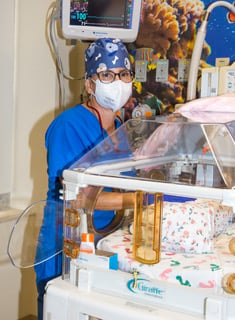What is essential in health care? The answer depends on who you ask. To Brenda Griner, APRN, MSN, MHA, critical thinking when treating the sickest of babies is imperative. When Brenda was a staff nurse at Broward Health over 30 years ago, she was first introduced to the role of the Neonatal Nurse Practitioner. Brenda saw an opportunity to develop her skills and continue as a bedside clinician. As an NNP, she can perform advanced procedures and remains excited about advanced practice prospects.
Working through misconceptions
Although each passing decade has brought a better understanding of the nurse practitioner role, Brenda explains there can still be certain misunderstandings. Initially, the advanced practice provider role was not clearly delineated; though not a doctor and not a nurse, nurse practitioners were expected to perform both roles. There was confusion even in the hospital setting, both on the part of the patient’s families and the medical staff. Brenda says being a female may also factor in – families often assume the NNP is the bedside nurse. Overall, the confusion rests with the lack of understanding of the education and clinical experience required. Thankfully, today the role is more widely accepted and understood.
 Always learning
Always learning
Brenda values the intellectual side of her career and knows that MEDNAX does a lot as a company to support that. From websites to forums, she can access and share ideas with clinicians across the country. Brenda notes that quality research and the people behind it are very accessible. Recently she was working on writing a protocol for Neonatal Abstinence Syndrome and was able to reach out to a MEDNAX physician who was happy to provide valuable insights to a serious problem. She credits the MEDNAX network for its tremendous database of knowledge, especially since there are numerous ways to approach a challenging case. In the daily course of her work, Brenda enjoys working with her team and brainstorming to develop a plan of care for patients. There is a high level of intellectual stimulation within her workday, and she is always learning new things.
Teaching others
Beyond her work with patients, Brenda values being able to mentor others. As her career progresses, she knows she will continue to pass along the things she’s learned through the years, whether to new practitioners or staff nurses. Her advice for up-and-comers is to be patient with themselves. Nurses progressing to the NP role need to be aware that it is different from bedside nursing. The amount of information and skills required takes time to acquire even after completion of NP training programs. A few simple reminders: Take a deep breath. Don’t give up. Be persistent. Know what you do is important for babies and their families. Brenda beautifully expresses her advice, stating, “The most important thing to remember is you are taking care of someone else’s most important thing: their precious baby.”
 Looking forward
Looking forward
Brenda’s fondest memory of patient feedback spurs from dealing with a particularly difficult and heartbreaking case where she was able to comfort, soothe, and educate the family involved. Making families feel as calm as possible in a bad situation is a big part of Brenda’s approach to care. Being able to hear “you have no idea how much you helped me” is the kind of feedback that Brenda says makes her day. Living in the same community as the hospital she serves allows her to periodically run in to former patients and families, which is an added benefit. This interaction leaves Brenda knowing that throughout her career, she has made a difference in people’s lives. She derives tremendous satisfaction from that.
Brenda is the type that is always looking to the future. She strives to accomplish more and continues to improve her practice. Her goals for the remainder of her career are to continue to learn, develop strong working relationships, and always enhance her overall practice capabilities.
To find a career as a neonatal nurse practitioner, check out our openings.

